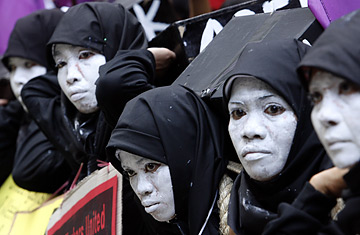
Domestic workers wear black clothes and paint their faces to symbolize their unhappiness during a protest in Hong Kong, November 2006.
I'd only moved to Hong Kong a couple of weeks before, but already I recognized my fellow marchers. Six days a week, these migrant workers are the city's "domestic helpers" — amahs in Cantonese — earning about $450 a month as maids, nannies and cooks in nearly 200,000 Hong Kong households. On Sundays, thousands of Filipinas take over the commercial hub, the Central district. They swarm sidewalks and elevated walkways to spend their sole day off picnicking, playing cards, singing and swapping gossip. If you linger long enough, as I did my first week, you're sure to be offered tea and snacks.
For a couple of past Sundays, however, the amahs have also marched. They're protesting new legislation in the Philippines that requires maids who work overseas to undergo two weeks of official training and tests. The $300 associated cost comes out of the amah's pocket, which is what has Hong Kong's Filipinas up in arms. They're quick to note that they already pay the government placement fees while, at the same time, Hong Kong officials cut their minimum wage by $50 a month two years ago. "How will we afford this on our small salaries?" asks Dolores Balladares, the march's organizer. "Our government just wants to make our lives more burdened and more miserable."
The Philippine government counters that the new licensing rules will allow Manila to more closely monitor the domestics they export and therefore protect them from abuse. Says Rosalinda Baldoz, administrator of the Philippine Overseas Employment Administration, "We are tired of hearing stories of Filipino maids being attacked in the face with a hot flat iron by her employer." Across Asia, rampant reports of imported workers suffering inhumane treatment include inadequate wages, verbal and physical assault, even rape. Last month, leaders of the Association of South-East Asian Nations, meeting in the Philippines, also took similar steps to regulate and aid the region's millions of migrant workers. According to Manila's argument, workers accredited with specific skills would not be vulnerable to such attacks. They have also limited the training and licensing fees to new applicants for domestic jobs. Labor organizers argue that it is these young workers who can least afford the new fees.
Back in Hong Kong, the amahs are known by the Tagalog nickname bayani. As we walked toward the Philippines consulate, they explained to me that it translates as heroine, which is what most of these women are to the family and friends they've left behind. Plagued by poverty and unemployment, the Philippines has exported about 8 million workers, the vast majority of whom are women. In the first half of last year, these mothers, sisters and daughters sent home more than $8 billion in remittances, roughly 10% of the country's GDP. That dollar figure is expected to double by 2010 and doesn't include probably another couple billion in cash brought by suitcase. "I have two sons. My heart is broken to leave them," one amah, Ana Tellez, told me. "But there is no work at home. We'd starve if I wasn't here." My bean cake, which I had hungrily finished just minutes before, quickly sank to the pit of my stomach.
